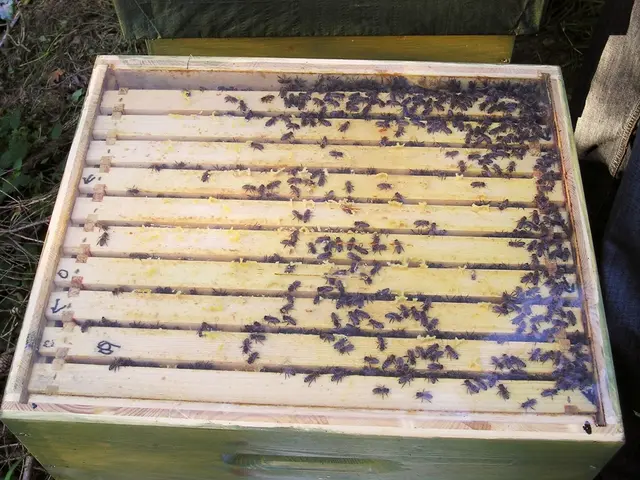International gathering in France aims to attract researchers facing potential funding reductions in the United States
Cash-Laden EU Woos Disgruntled U.S. Scientists
Gathering EU commissioners, scientists, and research ministers from member countries will convene a conference, dubbed "Choose Europe for Science", in Paris's prestigious Sorbonne university. The conference is scheduled to finish with speeches by President Macron and Commission President Ursula von der Leyen.
Why is this gathering significant? The simple answer: to entice disgruntled American scientists seeking refuge from political and financial pressures under the Trump regime, such as looming federal funding cuts, research program closures, job losses, and the specter of potential deportation for holding controversial views[1][3][4].
The European Union, with a universalist vision, wishes to extend a welcoming hand to researchers, intending to safeguard their strategic interests while fostering an attractive continent for science[4].
Just last month, President Macron urged foreign researchers, particularly those from the U.S., to "choose France" amid his plans for a funding programme designed to help French universities and other research institutions cover the costs of recruiting foreign scientists[4].
Aix-Marseille University in the south of France proudly announced its "Safe Place for Science" scheme, which has already seen an outpouring of applicants since it was launched in March, aimed at offering a safe haven to US scientists threatened by budget cuts[4][5].
Last week, France's New Kid on the Block in scientific research, the CNRS, unveiled an initiative to entice foreign researchers whose work may be under threat, as well as French researchers working abroad who prefer not to reside in Trump's United States[4].
The timing of the conference comes at a crucial juncture, given the worldwide retreat of academic freedoms in various instances, making Europe an increasingly attractive destination[4].
Yet, challenges remain. Although the EU offers competitive research infrastructure and quality of life, research funding and remuneration for scientists are substantially below US levels[4]. However, CNRS President Antoine Petit remains optimistic, hoping that the wage disparity will feel less daunting once lower education and health costs, as well as more generous social benefits, are factored into the equation[4].
The French government and the EU are targeting researchers in selected areas, such as health, climate change, biodiversity, artificial intelligence, and space[4]. With a substantial €500 million ($566.6 million) package for global researchers from 2025–2027[1][3][5], Europe seems poised to compete for top scientific talent.
Stay tuned for updates on this exciting scientific diplomacy!
(with AFP)
P.S. Wondering about the financial aspect of this grand plan? The EU has committed a whopping €500 million ($566.6 million) for 2025–2027 to attract global researchers, including US scientists[1][3][5]. France plans to co-finance up to 50% of selected research projects, as part of this broader EU initiative[4].
- The conference, titled "Choose Europe for Science", will take place at the Sorbonne university in Paris, and will be attended by EU commissioners, scientists, and research ministers.
- The goal of this gathering is to attract disgruntled American scientists who are facing political and financial pressures in the United States, such as looming federal funding cuts, research program closures, job losses, and potential deportation.
- The European Union (EU) aims to provide a welcoming environment for these scientists, with the intent of safeguarding their strategic interests and making Europe an attractive continent for science.
- Last month, President Macron urged foreign researchers, particularly those from the U.S., to consider France as a destination, announcing a funding program to help French universities cover the costs of recruiting foreign scientists.
- Aix-Marseille University in France has already seen an influx of applicants for its "Safe Place for Science" scheme, which offers a safe haven to US scientists threatened by budget cuts.
- The CNRS, France's leading scientific research organization, has also unveiled an initiative to attract foreign researchers whose work may be under threat, as well as French researchers working abroad who prefer not to reside in the United States.
- The EU is targeting researchers in specific areas, such as health, climate change, biodiversity, artificial intelligence, and space.
- With a substantial €500 million ($566.6 million) package for global researchers from 2025–2027, Europe seems poised to compete for top scientific talent, including US scientists.
- The French government plans to co-finance up to 50% of selected research projects as part of this broader EU initiative, which has committed a significant amount of funding to attract global researchers.


![Altered image portrayal: In this image, the viewer can see [name of person/object] prominently displayed. The composition appears to have been manipulated, as [description of the manipulation]. [Any additional details about the image.] US Researchers Heading for Exit Due to Trump Policies to Be Courted by Macron and von der Leyen at Paris Conference on Monday](https://eduimpact.top/en/img/20250505102101_image-description-sunset-beach-landscape.jpeg)







